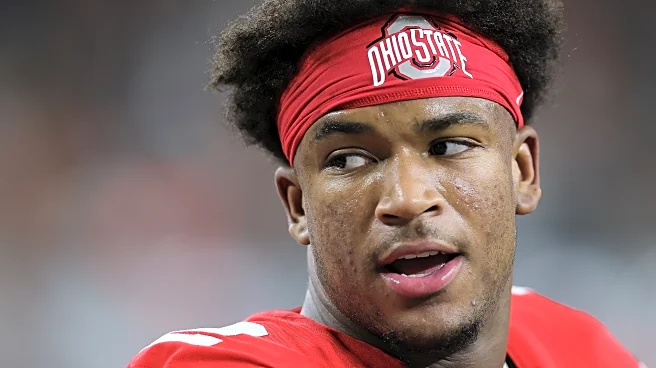What's Happening?
During the recent broadcast of 'ESPN College Gameday,' Pat McAfee's kicking contest returned, offering substantial cash prizes to participants. Logan Pallo, a sophomore at Ohio State University, was selected to attempt a 33-yard field goal for a chance to win $250,000. Pallo, who regularly practices kicking with his brother, successfully made the kick on his first try. However, just before his attempt, he accidentally stepped in a pile of poop left by Kirk Herbstreit's dog, Peter. Despite this unexpected incident, Pallo's successful kick and the humorous situation were well-received by the crowd, with McAfee jokingly suggesting that Pallo could use his winnings to buy new shoes.
Why It's Important?
The event highlights the entertaining and unpredictable nature of live sports broadcasts, particularly in the context of college football. Pat McAfee's contest not only engages fans but also provides significant financial incentives, adding excitement to the show. The incident involving Kirk Herbstreit's dog adds a humorous element, showcasing the spontaneous and unscripted moments that can occur during live television. This type of engagement is crucial for maintaining viewer interest and enhancing the overall experience of sports programming.
What's Next?
As college football season progresses, similar contests and events are likely to continue, drawing in fans and participants eager for both the thrill of competition and the chance to win substantial prizes. The success of such segments may encourage broadcasters to incorporate more interactive and engaging content, potentially leading to increased viewership and fan participation. Additionally, the humorous mishap may become a memorable anecdote, contributing to the show's legacy and viewer loyalty.
Beyond the Headlines
The incident underscores the unpredictable nature of live broadcasts and the importance of adaptability in sports entertainment. It also highlights the role of humor and light-hearted moments in building a connection with the audience, fostering a sense of community and shared experience. Such events can enhance the cultural significance of sports programming, making it more relatable and enjoyable for viewers.









